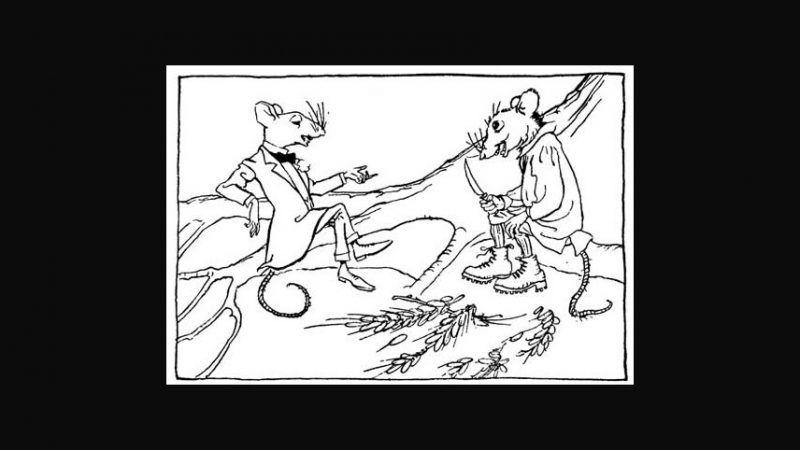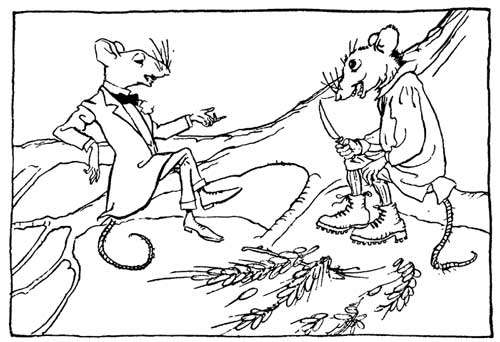Want to End Urban-Rural Conflict? Stop Looking for a Victor.
Whether red vs. blue or city vs. country, political tensions are best addressed by letting people run their own lives.


There's a spreading revolt against city-spawned restrictions on self-defense rights by the residents of sparsely settled counties and the officials who represent them. The issue "has largely underscored the rift between rural and urban areas," the Wall Street Journal noted over the weekend. It's a rift that's widening as the political divide in the United States takes on a strongly geographical character—less along state or regional lines than at the borders between dense populations and open country.
With hostile people from divergent cultures and political affiliations glaring at each other across the nation's city limits, it's time to reconsider the tendency towards centralization of power in our country that leaves so many people groaning under laws and policies they find abhorrent. If we really want to defuse tensions, we should devolve decision-making as far down the political food chain as possible—preferably all the way to individuals.
"Virtually every major city (100,000-plus population) in the United States of America has a different outlook from the less populous areas that are closest to it," Josh Kron marveled in The Atlantic after the 2012 election demonstrated divisions that have only deepened since.
Six years later, the 2018 mid-term election "results exacerbate a divide between booming urban centers and struggling rural communities that has been growing since the recession a decade ago," The Hill reported. Democrats are increasingly urban in terms of their support, while Republicans have come to rely on rural voters. The parties seem to battle only over the suburbs.
Values and policy preferences, not just party affiliation, break down along geographic lines. "Americans in urban and rural communities have widely different views when it comes to social and political issues, including their assessments of President Donald Trump and opinions about race, immigration, same-sex marriage, abortion and the role of government," the Pew Research Center found in 2018.
That polarization is partially driven by the tendency of Americans to move to where they feel comfortable and can live as they wish. Since lifestyle and politics have come to correspond very closely, the result is a "big sort" that emphasizes the conservatism of spread-out communities and the progressivism of walkable neighborhoods. Disagreements then become magnified, breeding tension.
"About two-thirds or more in urban and rural areas say people in other types of communities don't understand the problems people face in their communities. And majorities of urban and rural residents say people who don't live in their type of community have a negative view of those who do," Pew added.
Maybe that would be nothing more than a reflection of the wonderfully diverse world in which we live, and the room it allows for people to marvel at each other's peculiarities, if our factions were less dead-set on using government power to eliminate such differences. But despite school-room nostalgia for federalism and local rule, more political decisions than ever are made in state capitals and Washington, D.C. and imposed from above on the dissenting minority. Right now, that's a recipe not just for red vs. blue battles, but for closely related urban vs. rural conflicts.
This isn't the first face off between "hicks and slicks," as the factions were sometimes called a century ago. Then, as now, urbanites battled country dwellers over who was to dominate the country's political system. That neither side really had to dominate the other doesn't seem to have occurred to enough people.
The hicks won a battle with the imposition of Prohibition, forcing free-wheeling slicks to brew and distill their own, smuggle what they couldn't make, and otherwise acquire an appreciation for the DIY ethos so important to country dwellers.
Slicks returned the favor during the Great Depression, dispatching think tank agricultural "experts" to teach people who already raised crops and animals how to improve their practices by letting the fruits of their labor rot in the fields and experimenting with collectivization.
Tensions were papered over by imposing on everybody ill-considered policies whose depredations could be blamed on economic conditions, with subsidies to buy off remaining naysayers. And by World War II.
Maybe, if the two sides had found it in them to leave each other alone, we could have avoided the resurgence of city-country tension and the publication of red-and-blue-speckled voting-pattern maps that look like the consequences of losing a sirloin steak behind the stove. But they didn't leave each other alone—and the divide deepened.
Some urban political partisans look to demographic shifts and the decline of rural populations to make their ascendance permanent. "Cheer up, liberals, city dwellers will soon rule the world," Bloomberg trumpeted a few years ago.
Except… such ascendance isn't inevitable. "In fact, parts of rural America are thriving, even as other parts decline; just as parts of urban America continue to lose population and face economic decline as other parts make a comeback," urbanist Richard Florida pointed out last year. The entrepreneurialism rate in many rural areas leaves urban self-employment in the dust, I noted at about the same time.
Urban life in these data-driven, high-tech times is ever-more a matter of preference rather than necessity. If trends shift and the go-getters driving urban growth decide they'd rather build businesses in the laid-back country than in the fast-paced city, demographic determinism is bound to become rather less deterministic.
Besides, political "victory" in such a scenario can only seem satisfying to people who relish the prospect of a smug majority lording it over a seething minority. That sort of dominance is bound to result in yet more iterations of local people and officials boldly announcing their intention to ignore unwelcome laws, just like the rural revolt against gun control laws that extends even to New York.
A better outcome is an accommodation that seeks to keep everybody invested in the political system. That's something that can't happen if government and law are fought over as weapons to be used by one side to destroy all others.
Instead, we could emphasize the original, decentralized roots of our country. If political decision-making was kept as local as issues allow, the weight of rules and policies would fall as rarely as possible on the unwilling—and they could escape them with relative ease by moving someplace governed differently. Even better would be to emphasize the right of individuals to run their own lives, reducing the grumbling minority to the bare minimum.
Yes, we would have to grow accustomed to the sight of those people living in ways and by rules of which we disapprove. The bastards. But, if the current rural revolt is any indication, people will do that whether victorious political factions and angry officials like it or not.


Show Comments (182)